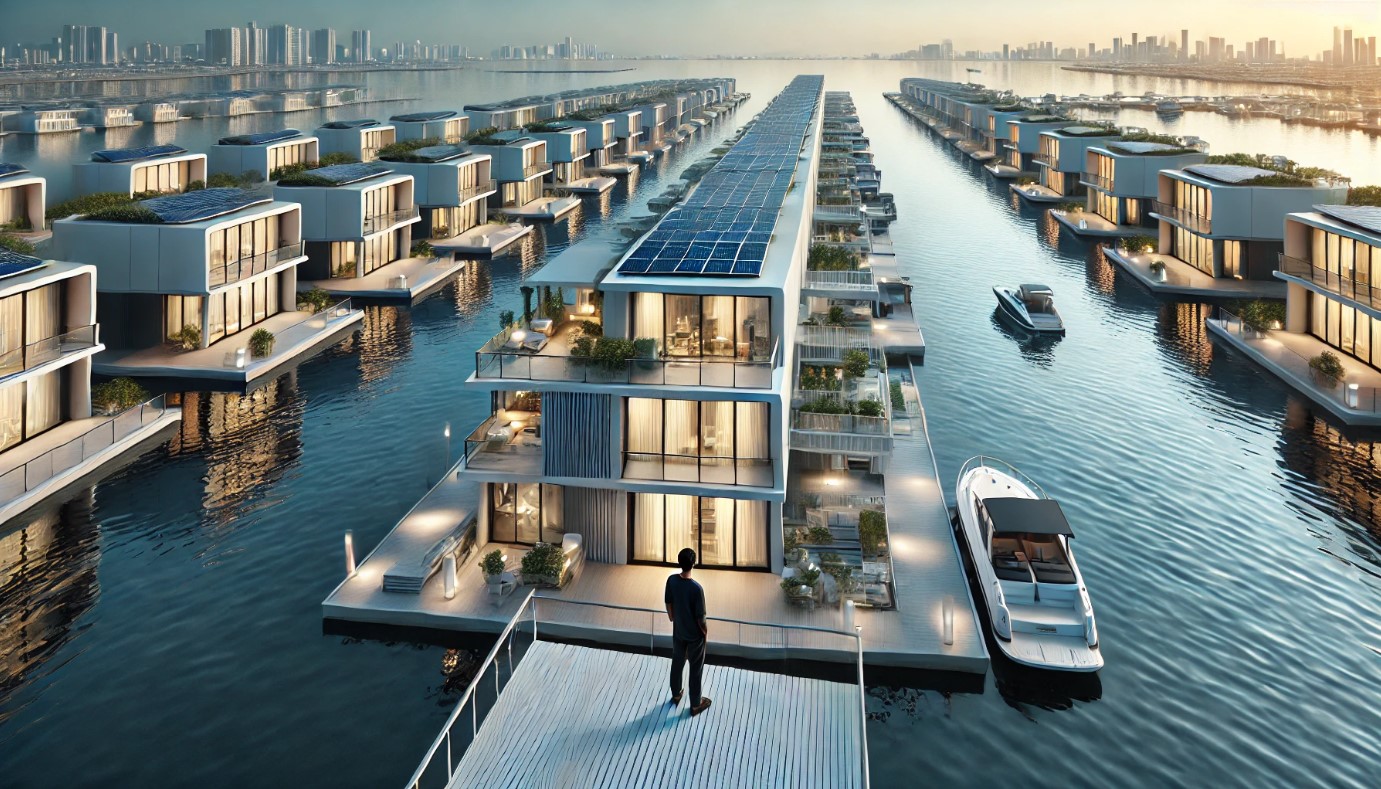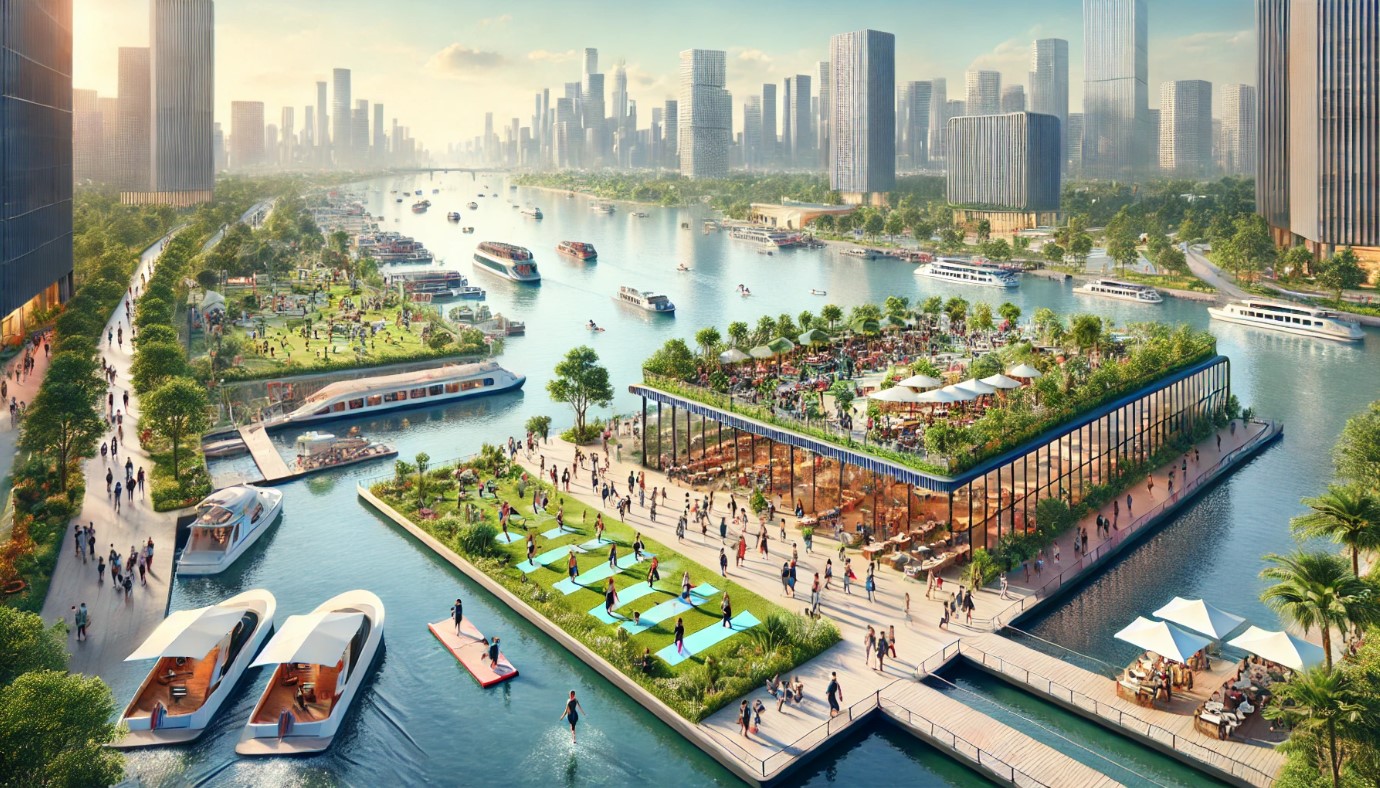Floating markets, a concept deeply rooted in the history and culture of riverine and coastal communities, are experiencing a resurgence in modern water-based trade and commerce. As urban areas face increasing land scarcity and populations shift toward more sustainable living, floating communities and markets present a dynamic solution to contemporary challenges. This article explores the potential of floating markets within floating communities and their contribution to the water-based economy.

The Historical Context of Floating Markets
Historically, floating markets have been integral to the daily lives of communities in Southeast Asia, particularly in Thailand, Vietnam, and Indonesia. These markets, where vendors sell goods directly from their boats, have long provided access to fresh produce, fish, and other commodities. Their success has been attributed to their ability to connect remote communities, ease of access via waterways, and the unique, vibrant atmosphere they create.
We mentioned them in one of our previous articles titled – Ancient Water-Based Communities: A Look Back at History and Lessons for the Future.

Modern Floating Supermarkets
Dubai’s “Bites and More by the Shore”
Dubai has pioneered the concept of a floating supermarket with Carrefour’s “Bites and More by the Shore.” This floating store caters specifically to yachters, jet skiers, and beachgoers, offering over 300 items, including food, beverages, pharmaceuticals, and beauty products. Operated via a custom-built Aqua Pod, the supermarket allows customers to sail up and place orders directly at a window counter. Orders can also be placed via phone or an app, with delivery within 45 minutes.
Ref: https://youtu.be/7ZKKfpoyShQ?si=pRiT4DrARFLCVFNJ

Turkey’s Migros Deniz Market
In Turkey, the supermarket chain Migros has launched a floating supermarket known as “Migros Deniz Market.” Operating along the Aegean coast between Fethiye and Göcek, this floating store serves tourists and locals on boats. The Migros Deniz Market operates daily during the summer months, offering a variety of products including fresh produce, snacks, and household items. This initiative not only provides convenience but also supports the local tourism industry by enhancing the coastal experience
Ref: https://youtube.com/shorts/7lptvBW9eEE?si=l2XPFGBfRh87pWJ_
https://turkey.redblueguide.com/en/a-floating-migros-shopa-super-market-yachtfor-shopping-in-the-sea

Qatar’s Al Meera Floating Supermarket
In Doha, Qatar, the Al Meera supermarket chain has introduced a floating supermarket at Doha Port. This floating market aims to serve the needs of boaters and residents living near the port, offering a range of groceries and essentials.
Ref: https://youtube.com/shorts/vHDg3Mgrx4o?si=iOJ7F_67EjnOIzEb

India’s Thriveni Floating Supermarket
In India, the Thriveni floating supermarket operates on the backwaters of Kerala. This market serves remote areas that are difficult to reach by road, providing essential goods and groceries to local communities. The floating supermarket is an essential service for many residents, ensuring they have access to necessary supplies despite geographical challenges
Ref: https://youtu.be/noIjpFYxBJk?si=UAObtrVnv6i8rQ3B
https://gulfnews.com/world/asia/india/keralas-floating-mall-doing-brisk-business-1.586549

Nestlé’s Floating Supermarket in the Amazon
Nestlé launched a floating supermarket in the Amazon, targeting remote communities along the Para and Xingu rivers. From 2010 to 2017, this supermarket boat provided access to over 300 items, including processed foods like chocolate, ice cream, and milk powder. While the initiative aimed to broaden access to food, it faced criticism for contributing to rising obesity and diabetes rates in the region. Nestlé defended the project by emphasizing its efforts to promote healthier choices and support social development in remote communities
Ref: https://youtu.be/cduesi9oPUQ?si=sR6lZmqRT1ZDIpj9

Economic Benefits of Floating Markets
- Increased Accessibility and Reach: Floating markets enable goods and services to reach communities that may be isolated or underserved by traditional land-based markets. This increased accessibility can stimulate local economies by providing a platform for local artisans, farmers, and small businesses to sell their products.
- Tourism and Cultural Appeal: The unique charm and cultural significance of floating markets make them attractive tourist destinations. Visitors are drawn to the vibrant, bustling atmosphere, which can boost local tourism and create additional revenue streams for the community.
- Flexible and Resilient Infrastructure: Floating markets offer resilience against flooding and other climate-related challenges. Their mobility allows them to adapt to changing water levels and environmental conditions, ensuring continuity of trade even during adverse weather events.
- Sustainable Commerce: By leveraging existing waterways, floating markets reduce the need for land development and the associated environmental impact. This aligns with the principles of sustainable development and supports the creation of eco-friendly communities.

Potential for Expansion and Innovation
The potential for floating markets extends beyond traditional goods. With the integration of modern technology and innovative practices, these markets can offer a wide range of products and services:
- Aquaculture and Fisheries: Floating markets can support the sale of fresh, locally-sourced seafood and aquaculture products, promoting sustainable fishing practices and providing a vital food source for floating communities.
- Renewable Energy Solutions: Markets can include vendors specializing in solar panels, wind turbines, and other renewable energy technologies, supporting the self-sufficiency and sustainability of floating communities.
- Healthcare and Education Services: Floating clinics and schools can operate within these markets, offering essential services to residents without the need for permanent land-based facilities.
- Entertainment and Leisure: Floating markets can host cultural events, performances, and recreational activities, enriching the community’s social fabric and enhancing the overall quality of life.

Challenges, Considerations & Revival
While the potential of floating markets is vast, there are challenges to consider. Ensuring the safety and stability of floating structures, managing waste and pollution, and navigating regulatory frameworks are critical factors in the successful implementation of floating markets. Collaboration between designers, engineers, policymakers, and the community is essential to address these challenges and create thriving water-based economies.

Floating markets represent a harmonious blend of tradition and innovation. By leveraging historical trade practices and integrating modern sustainability measures, floating markets can play a pivotal role in the economy of water-based communities. The success of floating supermarkets in Dubai, Turkey, Qatar, and India underscores their growing relevance and potential in today’s world. As urban areas grapple with land scarcity and environmental concerns, the revival and modernization of floating markets offer a promising pathway toward sustainable and resilient commercial practices.

Today, floating markets are being revived and adapted to meet modern needs. In floating communities, such as those being developed by V-Marine and other innovators, floating markets offer a sustainable and flexible approach to commerce. They can operate in various environments, from rivers and lakes to coastal regions, without the need for extensive land-based infrastructure.




